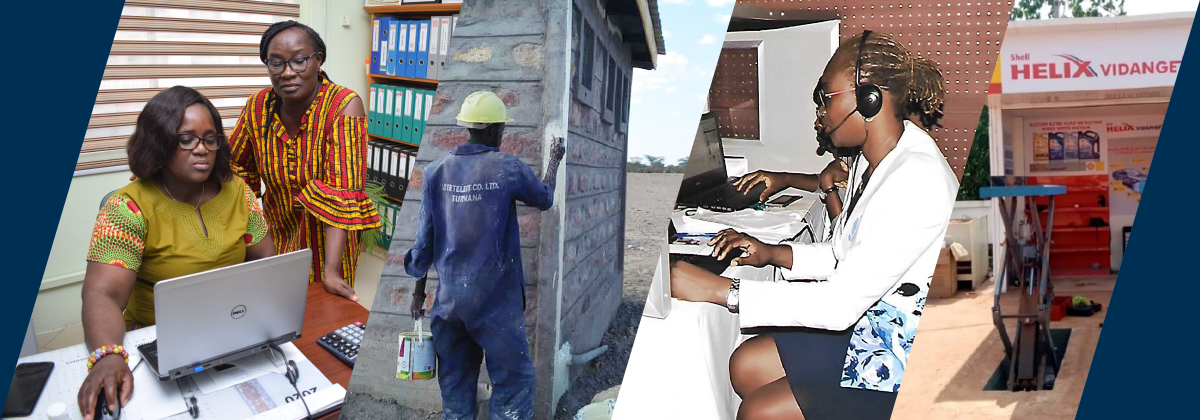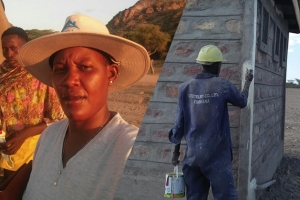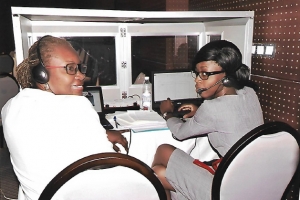Blog
Mar 8, 2021

For Guinea’s Hawa Diarra, owner of an auto repair shop and a supplier of petrol station equipment, the value of an IFC workshop she attended was the emphasis on quality control and responsiveness.
For Kenya’s Lydia Toiko, an IFC marketing and communications workshop gave her insight into how to promote her construction company’s presence within a tightly knit, male-dominated business community.
These are a couple of the women business owners who have benefited from a program sponsored by IFC and Canada that supports women entrepreneurs in Cote D’Ivoire, Ghana, Guinea, and Kenya. It boosts women’s business management skills so they can take advantage of the economic opportunities linked to large infrastructure and natural resource investments.
Increasing competitiveness of Africa’s women-led businesses is a critical effort at a time when the COVID-19 pandemic threatens to undo decades of economic progress in developing countries, plunging millions back into poverty and disproportionately affecting women. It’s also key to a brighter future in Africa: a region with one of the highest rates of entrepreneurial activity in the world, women are more likely than men to be entrepreneurs.
And yet, in Africa, female-led enterprises have profits that are on average 34 percent lower than those run by men. There are several reasons for this divide, including lack of business knowledge, choice of sector, and limited access to capital. The Canada-IFC program aims to address some of these issues, giving women in four resource-rich African nations the business skills, leadership savvy, and competitive edge that form the building blocks of commercial success. With these fundamentals in place, businesses are better positioned to compete for contracting opportunities and even qualify for the financing needed to grow.
The program is designed to embolden women, empowering them to build their businesses in sectors typically dominated by men. Such sectors often yield higher incomes than those where women are over-represented: One recent global study found that male- and female-owned firms in male-dominated sectors such as construction, warehousing, repairs, and transport earned significantly more than those in female-dominated sectors, such as retail, hospitality, or social services.
 In Kenya, seizing the opportunity and realizing higher income is the reason Lydia decided to start her own construction company. Given the number of new investments in Kenya’s Turkana County, Lydia realized that qualified local suppliers had strong earnings potential. A nutritionist by training, she was working hard but not earning much. So, she shifted gears, starting Loteteleit Company, Ltd. in 2014. To date, Loteteleit is among only a handful of women-led construction companies in Turkana, the country’s most impoverished county, where literacy rates are extremely low, particularly among women.
In Kenya, seizing the opportunity and realizing higher income is the reason Lydia decided to start her own construction company. Given the number of new investments in Kenya’s Turkana County, Lydia realized that qualified local suppliers had strong earnings potential. A nutritionist by training, she was working hard but not earning much. So, she shifted gears, starting Loteteleit Company, Ltd. in 2014. To date, Loteteleit is among only a handful of women-led construction companies in Turkana, the country’s most impoverished county, where literacy rates are extremely low, particularly among women.
“In Turkana, very few men are supportive of women in business. They see you as lesser beings. It’s very difficult for women in Turkana to hold land or asset titles so accessing finance is very difficult. To succeed, especially as a woman, you have to be strong, resilient and have a high tolerance for risk. You need critical thinking and problem-solving skills. And you need communications skills so you can articulate your vision and share it with investors, customers, and employees.”— Lydia Toiko, Owner, Loteteleit Company LTD, Kenya
After attending a marketing and communication workshop sponsored by IFC, she created a company brand, developed marketing materials, and increased her social media presence. This has elevated the company’s profile as word spreads about the company’s qualifications and capabilities. She’s winning road construction and water pan building tenders against male-run firms as a result. And she’s been able to hire more contract workers. Going forward, Lydia hopes to expand the business so she can maintain a full-time workforce, creating new jobs in a region desperately in need of such opportunity. Plans also include apprenticeships for local workers—especially women—to increase the local pool of skilled workers.
 In Cote d’Ivoire, underpinning entrepreneurial dreams with business basics was the pivot point for gifted linguist Marie-Anne Assanvo. The lessons from a six-month program in Cote d’Ivoire, combining business training and one-on-one coaching, made her re-think her entire approach to entrepreneurship. Translation is a booming service sector in Cote d’Ivoire, where foreign investment is driving strong demand for professionals with a specialized multilingual vocabulary. But an early attempt to capitalize on her skillset ended in bankruptcy. Marie-Anne now attributes her early failure to a lack of business knowledge and the difficulty finding a niche in a crowded marketplace dominated by male-run firms.
In Cote d’Ivoire, underpinning entrepreneurial dreams with business basics was the pivot point for gifted linguist Marie-Anne Assanvo. The lessons from a six-month program in Cote d’Ivoire, combining business training and one-on-one coaching, made her re-think her entire approach to entrepreneurship. Translation is a booming service sector in Cote d’Ivoire, where foreign investment is driving strong demand for professionals with a specialized multilingual vocabulary. But an early attempt to capitalize on her skillset ended in bankruptcy. Marie-Anne now attributes her early failure to a lack of business knowledge and the difficulty finding a niche in a crowded marketplace dominated by male-run firms.
“For a woman leading a business in a male-dominated field, good is not enough. You have to be great. The IFC training taught me how to build on my strengths and gave me the skills I was missing so I could become the best version of myself.”— Marie Anne Assanvo, Owner Myrhann Traductions, Cote d’Ivoire
Her new business, Myrhann Traductions, started in 2018, has an innovative twist. Stemming from her frustrations sitting in hours-long traffic jams to pick up and deliver client documents, Marie-Anne digitized her translation service offerings—the first company in Cote d’Ivoire to do so. She credits the IFC-sponsored training and coaching with opening her eyes to the ingredients of commercial success, including sound planning, budgeting, marketing, and pricing strategies. “If I had known then what I know now, I don’t think my first business would have failed,” she says.
 In Guinea, doubling down on quality and customer service for a competitive edge was Hawa’s key takeaway from IFC support. A university graduate with a business degree and a background in petroleum sales, she already knew the basics. For Hawa, the content of the more advanced quality control workshop she attended—part of a capacity-building program for SMEs registered at the Guinea Buyers and Supplier Marketplace—resonated strongly, prompting change. A heightened focus on consistent quality, customer service, and professionalism now set her apart, since these are not common characteristics of vehicle repair and supply shops in Guinea. “I didn’t paint my garage pink, but you can still tell a woman owns it, because of how neat and organized it is,” she laughs. Major commercial customers and individual car owners alike are responding, propelling revenue growth and plans to further modernize the garage.
In Guinea, doubling down on quality and customer service for a competitive edge was Hawa’s key takeaway from IFC support. A university graduate with a business degree and a background in petroleum sales, she already knew the basics. For Hawa, the content of the more advanced quality control workshop she attended—part of a capacity-building program for SMEs registered at the Guinea Buyers and Supplier Marketplace—resonated strongly, prompting change. A heightened focus on consistent quality, customer service, and professionalism now set her apart, since these are not common characteristics of vehicle repair and supply shops in Guinea. “I didn’t paint my garage pink, but you can still tell a woman owns it, because of how neat and organized it is,” she laughs. Major commercial customers and individual car owners alike are responding, propelling revenue growth and plans to further modernize the garage.
“We have to change mindsets that women can’t do technical things. Of course, they can, but they need training and encouragement.”— Hawa Diarra, Owner, Garage Auto HR, Guinea
 In Ghana, strengthening the business operating model and improving performance were some of the results other women business leaders have cited the benefits of the Canada-IFC program as well. For example, in western Ghana, drinking water supplier Western Global Technologies has grown, capturing nearly 75 percent of the market in Sekondi-Takoradi, the region’s capital city, with its Global Splash mineral water. Chief operating officer Cynthia Ann Dumako attributes this recently acquired dominance to the lessons learned and applied from business skills courses and advisory support received through the program. This includes strengthening corporate governance and the board’s role, improving client relationship management, and cutting costs. A newly prioritized emphasis on inclusive human resources policies such as paid maternity leave has helped the company retain more of its female workers, which has reduced turnover and increased productivity.
In Ghana, strengthening the business operating model and improving performance were some of the results other women business leaders have cited the benefits of the Canada-IFC program as well. For example, in western Ghana, drinking water supplier Western Global Technologies has grown, capturing nearly 75 percent of the market in Sekondi-Takoradi, the region’s capital city, with its Global Splash mineral water. Chief operating officer Cynthia Ann Dumako attributes this recently acquired dominance to the lessons learned and applied from business skills courses and advisory support received through the program. This includes strengthening corporate governance and the board’s role, improving client relationship management, and cutting costs. A newly prioritized emphasis on inclusive human resources policies such as paid maternity leave has helped the company retain more of its female workers, which has reduced turnover and increased productivity.
“I had an accounting background, but the IFC training made me realize that I had so much more to learn about how to manage company operations. With a strengthened operating model, we are now looking at expanding into new product lines, such as bottled water, soft drinks and industrial ice.”— Cynthia Ann Dumako, COO, Western Global Technologies, Ghana
Although these four women represent but a handful out of thousands, their experience demonstrates the profound impact of such targeted guidance. And it shows the potential for harnessing the collective power of women-led small businesses to drive post-pandemic local economic recovery.
With contributions from: Ekoue Henri Rene Ahyite, Fatoumata Bah, Joel Andre Colomb, Brigid Commey, Bintou Kaba, Fatoumata Binta Keita, Ann Moline, Purity Wanjira Ndereba, Gosia Nowakowska-Miller, Valerie Prassl
Click here to read this story in French | Cliquez pour lire en français.